18 Oct 2019 | Awards, Fellowship, Fellowship 2015, Fellowship 2016, News and features
[vc_row][vc_column][vc_column_text]
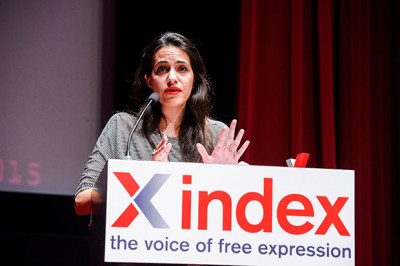
Documentary maker and journalist Safa Al Ahmad (Photo: Alex Brenner for Index on Censorship)
Index on Censorship will begin a set of college events across the USA on 21 October 2019 as part of its Free Speech Is For Me programme.
The tour will include discussions with special guests such as Safa Al-Ahmad, a Saudi Arabian journalist and filmmaker who has directed documentaries focusing on uprisings in Yemen and Saudi Arabia and a former winner of the Index on Censorship Freedom of Expression Award for Journalism.
The first stop will be at Columbia University, New York, on 21 October where Al-Ahmad will discuss impunity and the silencing of dissent in Saudi Arabia with Agnès Callamard, special rapporteur on extrajudicial, summary or arbitrary executions at the Office of the United Nations High Commissioner for Human Rights.
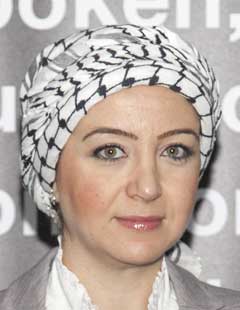
Zaina Erhaim (Sean Gallagher / Index on Censorship)
On 22 October Al-Ahmad will be in conversation with Zaina Erhaim, the Syrian journalist who returned to Syria after war broke out to help train female citizen journalists and a former winner of the Index on Censorship Freedom of Expression Award for Journalism, about local journalists on the front lines of the wars in Syria and Yemen at the University of Pennsylvania, Philadelphia.
And then on 23 October Al-Ahmad will be interviewed by University of Delaware professor emeritus Ralph Begleiter on what it’s like to travel through a war zone in Yemen, the challenges of being a female journalist in the Middle East and what impact the murder of Washington Post reporter Jamal Khashoggi has had on journalists in Saudi Arabia.
The campus tour will take place during Free Speech Week, a national event to promote free speech and freedom of the press in the USA. Rachael Jolley, editor-in-chief of Index on Censorship, said: “This campus tour is an important part of the work that Index is doing in the USA to talk with students about why free speech is vital for all of us, and has always been at the heart of the ways laws and attitudes are changed. We want to hear what lots of people have to say.”
In another part of the Free Speech Is For Me programme, twelve applicants will receive one-on-one support from leading free speech experts, as well as media, communications and public speaking training. Participants will gain a clearer understanding of the challenges of censorship around the world and the tools to overcome them, as well as how to best advocate for and use free speech principles.
“‘Free speech has become a dirty word in the last few years,” Jodie Ginsberg, Index on Censorship’s chief executive, said. “Free Speech Is For Me aims to show how freedom of expression furthers democracy and individual liberty and benefit everyone. If we allow free speech protections to be weakened, we lose our greatest tool in advocating for change.”
You can find more information about the campus tour and how to attend on the Index on Censorship events page. [/vc_column_text][/vc_column][/vc_row][vc_row][vc_column][vc_basic_grid post_type=”post” max_items=”4″ element_width=”6″ grid_id=”vc_gid:1571413290506-656617e0-84ba-7″ taxonomies=”8935″][/vc_column][/vc_row]
19 Mar 2018 | About Index
We write to you as former winners of the Index on Censorship Freedom of Expression Award for journalism – and as exiles from our homes. All three of us have been forced into exile because of our work as journalists: in Saudi Arabia, Syria and the Maldives respectively. All three of us in the past three years.
No one wants to be forced to leave their place of birth. We reported on war, corruption and cover-ups in the countries in which we were raised and which we love – and our punishment has been expulsion and persecution. We write to you, separated from our families, and from homes that are not homes.
We have all received death threats. Repeatedly.
Zaina – who survived the Syrian regime’s crackdown on the uprising then the war, finally had to leave after she became a target for militias and troops. Safa, who spent three years covertly filming a mass uprising in Saudi Arabia’s Eastern Province, now moves from country to country. Zaheena, editor of an online newspaper, fled the Maldives after a police raid on her office following a long period of harassment in which she received death threats and a colleague was disappeared.
None of us consider ourselves brave or courageous. We are not reckless. We are women who simply want to write and broadcast freely about what is happening in the world. We continue to do this, even as exiles*.
But no one should have to live like this simply for being a journalist.
We need to speak out on media freedom. We need to support those speaking out. To continue to do this effectively in the challenging times ahead, Index needs your help.
A donation of £20 ensures a verified attack against media freedom is mapped publicly online; a gift of £100 enables an official report to pressure governments; a gift of £1000 supports our work helping journalism fellows.
Our goal is to raise at least £15,000 by the end of March for our work on media freedom over the next six months.
We hope you will join us in supporting Index and your right to a free press. Please donate today.
Yours,
Safa Al Ahmad, Zaina Erhaim, Zaheena Rasheed
*Zaina works for the Institute for War and Peace Reporting, Zaheena for Al Jazeera, and Safa continues to work as a freelance journalist.
19 Mar 2018 | News and features, Press Releases
[vc_row][vc_column][vc_column_text]Three former winners of the Freedom of Expression Journalism Award have written a letter in support of Index on Censorship’s media freedom month, which aims to raise £15,000 to support its work on media freedom over the next six months.
The three journalism fellows, Syrian Zaina Erhaim, Saudi Safa Al Ahmad and Maldivian Zaheena Rasheed spoke of their forced exiles from their home and families due to their career as journalists.
“None of us consider ourselves brave or courageous. We are not reckless. We are women who simply want to write and broadcast freely about what is happening in the world.”
They continue to do this, even as exiles. Erhaim works for the Institute for War and Peace Reporting, Rasheed for Al Jazeera, and Al Ahmad continues to work as a freelance journalist.
They shared their determination not to be silenced: “We need to speak out on media freedom. We need to support those speaking out. To continue to do this effectively in the challenging times ahead, Index needs your help.”
A donation of £20 ensures a verified attack against media freedom is mapped publicly online; a gift of £100 enables an official report to pressure governments; a gift of £1000 supports our work helping journalism fellows.
Read the full letter here.[/vc_column_text][/vc_column][/vc_row][vc_row][vc_column][vc_custom_heading text=”Mapping Media Freedom” use_theme_fonts=”yes”][vc_separator color=”black”][vc_row_inner][vc_column_inner width=”1/4″][vc_icon icon_fontawesome=”fa fa-times-circle” color=”black” background_style=”rounded” size=”xl” align=”right”][/vc_column_inner][vc_column_inner width=”3/4″][vc_column_text]
Since 24 May 2014, Mapping Media Freedom’s team of correspondents and partners have recorded and verified more than 4,000 violations against journalists and media outlets.
Index campaigns to protect journalists and media freedom. You can help us by submitting reports to Mapping Media Freedom.[/vc_column_text][/vc_column_inner][/vc_row_inner][vc_separator color=”black”][/vc_column][/vc_row][vc_row][vc_column][vc_custom_heading text=”Don’t lose your voice. Stay informed.” use_theme_fonts=”yes”][vc_separator color=”black”][vc_row_inner][vc_column_inner width=”1/2″][vc_column_text]Index on Censorship is a nonprofit that campaigns for and defends free expression worldwide. We publish work by censored writers and artists, promote debate, and monitor threats to free speech. We believe that everyone should be free to express themselves without fear of harm or persecution – no matter what their views.
Join our mailing list (or follow us on Twitter or Facebook) and we’ll send you our weekly newsletter about our activities defending free speech. We won’t share your personal information with anyone outside Index.[/vc_column_text][/vc_column_inner][vc_column_inner width=”1/2″][gravityform id=”20″ title=”false” description=”false” ajax=”false”][/vc_column_inner][/vc_row_inner][vc_separator color=”black”][/vc_column][/vc_row]
9 Feb 2016 | Awards, Fellowship, Fellowship 2015, Index Arts, mobile, News and features
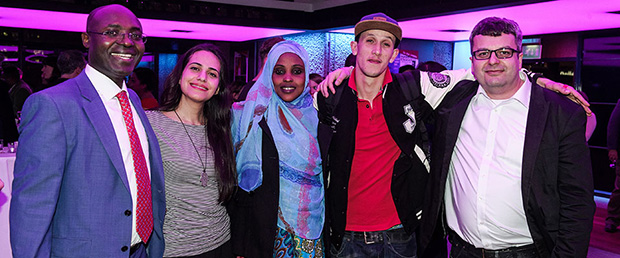
Rafael Marques de Morais, Safa Al Ahmad, Amran Abdundi, Mouad “El Haqed” Belghouat and Tamas Bodokuy (Photo: Alex Brenner for Index on Censorship)
When times get tough, freedom of expression can quickly fall down the list of priorities. But it is exactly in these circumstances when the ability to communicate and express yourself is most important. For this reason, we continue to draw inspiration from last year’s Index on Censorship Freedom of Expression Awards fellows and their struggles to keep freedom of expression alive and well.
As we look forward to the 2016 Index awards, here is our latest reminder of just how important a job our past winners do in the fight for free speech.
Tamas Bodoky, Atlatszo.hu / Digital Activism
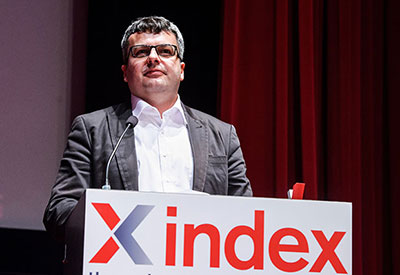
Last year was a positive one for the Hungarian investigative journalism site and NGO Atlatszo. The site’s yearly report reveals that funding was on the up and readership remained high.
The report also outlines the site’s main investigations over the course of 2015, which include exposing state corruption, public budget spending, irregularity within EU funding and land lease and privatisation controversies.
The website’s project for tracking down hate crime gained traction in 2014, and last year expanded to include “violent football hooligan groups and clergymen, who are close to the far-right,” the site’s executive director Tamas Bodoky told Index on Censorship.
“Unfortunately, some people became very hostile to our refugee crisis reporting last year, saying things like ‘go to hell, Atlatszo, for helping them’,” he added.
Atlatszo made 90 freedom of information requests as an organisation — plus hundreds of requests submitted by staff in their own names. Around 50% of Atlatszo’s requests were at least partially granted. Of those that weren’t, the site has initiated court proceedings to obtain the information, with almost half so far being successful, with several others pending.
Going forward, Atlatszo has plans to expand by working with more bloggers and developing a new website allowing Hungarian citizens to “question representatives of Hungary in EU, members of the Hungarian Parliament and — in the long run — representatives of the local governments”. The kepviselom.hu (my representative) project is currently seeking donors through crowdfunding.
“The Index award certainly helped get more international recognition over the last year,” Bodoky said. “As a very small news organisation, we constantly struggle for visibility, and Index on Censorship was instrumental in raising the visibility of our cause.”
Safa Al Ahmad / Journalism
 With the political crisis in Yemen steadily getting worse since last year, any plans Safa Al Ahmed had to switch focus were sidelined as she returned to the battle-scarred country.
With the political crisis in Yemen steadily getting worse since last year, any plans Safa Al Ahmed had to switch focus were sidelined as she returned to the battle-scarred country.
“I filmed events in Aden and then Taiz, which is currently besieged,” the award-winning journalist told Index on Censorship. “I’m going to be producing two separate films for both cities because north and south have very different dynamics.”
Actually getting into Yemen is a real task in itself. Al Ahmed and her crew took a boat from Djibouti to Aden, which took 34 hours, and then travelled for another day off-road and across mountainous terrain, passing snipers along the way.
With the execution of the prominent Shia cleric Nimr al-Nimr, Al Ahmad’s own country Saudi Arabia was briefly catapulted back into international focus at the start of 2016, but it didn’t last. “There is very little investigative journalism being done on the ground, which makes reporting difficult as there isn’t very much to build on,” Al Ahmed says.
Citing the flogging of blogger Raif Badawi as an example of how brutal the Saudi regime is of critical voices, Al Ahmad describes the state of free speech in Saudi Arabia as “frightening”. “The government have passed really wide rulings and laws so they can stop or arrest anyone for the simplest of reasons, including talking about the war in Yemen, which has been banned,” she explains.
The big difference between now and 2014 is that people are currently receiving death sentences, which is “a whole different level of intimidation”.
Mouad Belghouat aka El Haqed / Arts
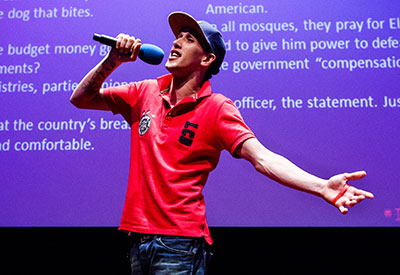 Last time we caught up with Moroccan rapper Mouad Belghouat, aka El Haqed, in October, he was in his home country keeping a low profile, while looking forward to performances in Florence, Italy, and at the 25th anniversary of the Moroccan Association of Human Rights in Brussels. Since November 2015, he has been living in Belgium, having applied for refugee status.
Last time we caught up with Moroccan rapper Mouad Belghouat, aka El Haqed, in October, he was in his home country keeping a low profile, while looking forward to performances in Florence, Italy, and at the 25th anniversary of the Moroccan Association of Human Rights in Brussels. Since November 2015, he has been living in Belgium, having applied for refugee status.
“In Morocco I felt threatened and under constant control,” he told Index this month. “It’s been hard, because already I miss the place where I grew up; I miss my family and my friends.” The situation in Morocco “deteriorates more and more every day, at all levels”, he explains, but vows one day to return.
He has now been cleared to work in Belgium, and has also turned his attention to creating more music. “I’m trying to finish the album I’ve been writing based on my experiences in prison in Morocco, and — as the last set of concerts have gone so well — I will be performing in Belgium in March and am looking to tour Norway come April.”
There are also plans for a biography based on his experiences from 2011, when his music became an anthem for many Moroccans involved in the Arab Spring, right up to his persecution at the hands of the authorities, right up to his eventual self-imposed exile.
As for the Index award, he said: “Through Index, I met many great people from all over the world who share the same principles as me, and word of my case has spanned the breadth of the world.”
Amran Abdundi / Campaigning
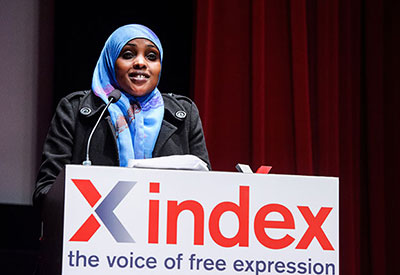 During our last conversation with Amran Abdundi, we discussed the attack in her native Kenya by Al-Shabaab linked terrorists on Garissa University College, in which 148 people were murdered. Abdundi, who knows many students from the college, immediately joined with other women leaders to organise strong community protests against Al-Shabaab.
During our last conversation with Amran Abdundi, we discussed the attack in her native Kenya by Al-Shabaab linked terrorists on Garissa University College, in which 148 people were murdered. Abdundi, who knows many students from the college, immediately joined with other women leaders to organise strong community protests against Al-Shabaab.
Last month, Abdundi attended the re-opening ceremony for Garissa University College. “I was happy to meet victims who I offered counselling to after the attack, and see them now back on their feet, ready to study and achieve their dreams,” she told Index.
She has also been busy recently with the upcoming launch of the new Frontier Indigenous Network website and implementing a new social media strategy to foster better connections between Kenyan women and the rest of the world.
As part of this new development plan, 2016 is packed with new projects, including an education programme on non-violence to counter violent extremism and radicalisation. The project will bring together Christians and Muslims together in “preaching peace and reconciliation”.
“All of this wouldn’t have been possible without the Index award and the support I have received from Index on Censorship, which led me to meet key individuals, such as Kenya’s woman minister, Anne Waigiru.”
Rafael Marques de Morais / Journalism
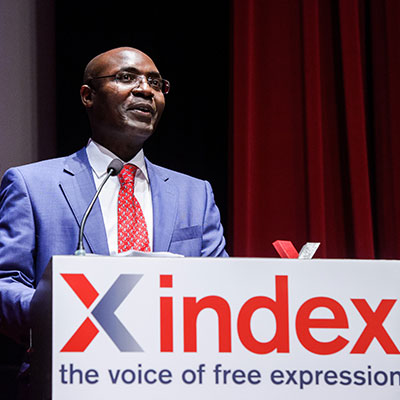 President José Eduardo dos Santos has been in power in Angola for over 35 years and his regime faces criticism on many fronts for, among other things, land grabbing, human rights abuses in Angolan prisons and the divvying up of the country’s resources to his family “like it was their inheritance”. These are just some of the issues Index award winner Rafael Marques de Morais is focusing on his activism and writing.
President José Eduardo dos Santos has been in power in Angola for over 35 years and his regime faces criticism on many fronts for, among other things, land grabbing, human rights abuses in Angolan prisons and the divvying up of the country’s resources to his family “like it was their inheritance”. These are just some of the issues Index award winner Rafael Marques de Morais is focusing on his activism and writing.
“This kind of work generates all sorts of troubles, because when you speak out against the president, you become suspect,” de Morais told Index on Censorship.
Being a high-profile activist within the country, there is a misconception that de Morais doesn’t feel the full force of the regime. “I might be ‘free’ but I can’t go anywhere; when I went for a drink recently the person I was with noticed we were being watched,” he explains. When he tried to enter a courtroom in December to observe the case involving the 15 Angolan bloggers now under house arrest, he was denied access. “Immediately the news on television was that I tried to enter the court illegally, because being high profile, the main thing they can attack is your reputation.”
Coupled with the ongoing economic crisis in Angola preventing citizens from taking money out of the bank, times are tough. “How is one supposed to survive and keep going?” he asks.
But go on he does. The attention from home and abroad, including that generated by the Index award, have provided some solace. “It’s always refreshing to know that people are interested,” he explains. “The award provides great encouragement for one to keep going.”
“But that’s it. The next day, you are back to struggling for survival.”
The Index on Censorship 2016 Freedom of Expression Awards shortlist has been announced.
This article was originally posted to Index on Censorship





 Last time we
Last time we  During our
During our  President José Eduardo dos Santos has been in power in Angola for over 35 years and his regime faces criticism on many fronts for, among other things, land grabbing, human rights abuses in Angolan prisons and the divvying up of the country’s resources to his family “like it was their inheritance”. These are just some of the issues Index award winner
President José Eduardo dos Santos has been in power in Angola for over 35 years and his regime faces criticism on many fronts for, among other things, land grabbing, human rights abuses in Angolan prisons and the divvying up of the country’s resources to his family “like it was their inheritance”. These are just some of the issues Index award winner